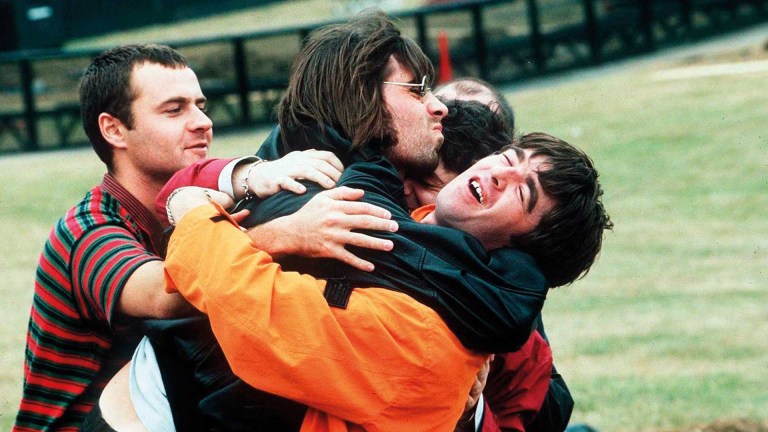Then he began to travel overseas, retracing his steps back to some of the cities he’d visited on tour but never had the chance to explore. Often, he says, he’d just up sticks entirely on a whim.
“Sometimes I was waking up that morning,” he remembers, “and I was in wherever I kind of figured I was gonna go the evening before. I did all this free roaming. I was just wandering around and taking some pictures, embracing the culture, putting myself out there and trying to be sociable. Looking for adventure really.”
Our 2020 Impact Report
The Big Issue has given more than £1 million support to Big Issue vendors struggling due to the lockdown restrictions. To mark the significant milestone, we have published an impact report, documenting the seismic shift the organisation has undergone in the past 12 months.
View ReportAs a result, today Nutini is fitter, happier and, indeed, more productive. If he attracted a few interested glances from his fellow diners in the Langham’s restaurant upon his arrival this Thursday afternoon, it was because he was sporting thick sunglasses and carrying a guitar, fresh from recording a radio session for Fearne Cotton across the street at the BBC. Once settled and shadeless, he could be any twentysomething indie kid: holey grey jumper and black jeans, carefully-sculpted bird’s nest of hair.
Post-Sunny Side Up, having rested and reset his head, Nutini went about making Caustic Love in a variety of different locations, from Glasgow to Dublin to Valencia to Los Angeles. Around the same time, his long-term relationship with Teri Brogan came to an end and the singer suddenly had no ties or responsibilities.
“I just felt,” he says, taking a long slug of his cocktail, “like I’d been cut free.”
Advertising helps fund Big Issue’s mission to end poverty
Nutini admits that the creation of his third album found him trying to get back in touch with what he’d loved about music as a youngster. Much has been made in the past of the fact that his vocal and songwriting talents allowed him to “escape” his background – his family down the generations have run a fish and chip shop business in Paisley. The singer himself, however, thinks that it’s a condescending, slightly insulting, view.
“Some people, especially Americans, can be so rude and patronising about that and say, ‘Oh I bet you’re so glad you dodged that bullet,’” he fumes. “It’s like, excuse me, Christ, Santa always came and we always got to see a bit of sunshine in the summer. Me and my sister were always kept warm, we were always kept fed.”
Returning the favour, then, Nutini insists he still has a lot of involvement with the family business from behind the scenes and says that his folks have as much access as they want to his subsequent wealth. “Really, I hope they know that if they didn’t want to do it any more, they could stop working tomorrow,” he says. “They have cards to my bank account. As far as I’m concerned, anything that I’ve been blessed with is ours.”
Some people, especially Americans, can be so rude and patronising about that and say, ‘Oh I bet you’re so glad you dodged that bullet’
Spotlighting this familial closeness, one track on Caustic Love, the moody funk of Looking for Something, was written in tribute to his mum and lists some of the advice that she had for the young Paolo as he was growing up: “Keep going against the grain and soon that’s all you’ll know/ Sometimes you’ll rise and there’s times you’ll fall.”
“Obviously I picked the more poetic and romantic of the advice she used to give me,” Nutini grins. “It wasn’t, ‘Get your shoes off the fucking carpet, son’, or ‘Fucking stop that racket up there’, or ‘Stop scratching yer baws.’”
Another huge formative influence on Nutini was his grandfather, who he’d often be sent to visit when his parents were busy in the shop. It was here that the singer first experienced the healing powers of music, as he watched his grandad, who’d recently lost his wife, play the piano in a state of heightened emotion.
Advertising helps fund Big Issue’s mission to end poverty
“It hit him quite hard and he did a bit of soul searching as an older man,” Nutini recalls. “He’d be sat at the piano with his glasses with the brown tint, head up, eyes closed, and just playing these beautiful arias from Aida and other operas.
“Every now and again I can even remember the wee tear trickling down. To me he was just singing and looking up and he was just like, ‘I hope you can hear this, darling.’”
During his high school years, when he discovered his own voice, Nutini quickly learned that music could be used for other important purposes, specifically to impress girls – even though, in his estimation, as a young teenager he looked like Pugsley from The Addams Family.
“I had a crew cut, a proper number three, I was never allowed a number one,” he laughs. “I’d be fucking raging and then even when I did get a number one, my hair would grow into a wee fuzz-nut straight away, number three again.
“So I’d go up and sing Wonderful Tonight by Eric Clapton or a Backstreet Boys song. Whatever girls liked. That was the criteria. I’d always get my ass kicked in a talent show though. There was always these great female singers and I was just up there trying to get a girl.”
Nutini’s break arrived in a similar situation, however, when he attended a Radio Clyde concert in Paisley Town Hall in 2003 headlined by David Sneddon, winner of BBC talent show Fame Academy. Sneddon was late in arriving due to a delayed flight and so the DJ compere filled time with a pop quiz.
Advertising helps fund Big Issue’s mission to end poverty
Nutini put his hand up to answer a question about the number one album of that week (Robbie Williams’ Escapology) and was coaxed onstage for an impromptu karaoke version of Elton John’s Your Song.
Can we work together with Westminster to get this fixed? Why has it been fear and scaremongering?
“I’m just like, ‘No, no, no, no, no,’” he remembers. “My head kinda hit the ground. And my girlfriend says, ‘Just go and do it, you’ll be brilliant’. You had to sing over the record, not just a backing track, so I was harmonising to it and stuff, trying to find a spot.”
In the audience was Brendan Moon, who went on to become Nutini’s manager. He arranged for the 16-year-old singer to be given extensive development time at Park Lane Studio in Glasgow. A year later, at only 17, he was signed to Atlantic Records and moved to London. He remembers it being a dizzying experience.
“I never really got a grip of what the hell was going on,” he confesses. “But there’s been such great surreal experiences along the way.”
With the release of his debut album, These Streets, in 2006, Nutini achieved vertical take-off, the record going on to be certified five times platinum in the UK. At the age of 19, he was invited by The Rolling Stones to support them in Austria and Britain and then went on to perform Love in Vain with them during their Isle of Wight festival appearance in 2007 (pictured below). His mind still boggles at the memory of rehearsing the song with Mick and Keith and the others in an emptied Travelodge room before the show.
“You go into the song,” he says, “and Keith goes to the A instead of the E and Ronnie’s like, ‘Fuck sake Keith, not in front of the boy’. Having a bit of banter. These guys are just effortlessly cool. Fuck knows what cool actually means, but whatever it is, they just ooze it.”
Advertising helps fund Big Issue’s mission to end poverty
The same year he supported the reformed Led Zeppelin at London’s O2 at the tribute concert for Atlantic Records founder Ahmet Ertegun, responsible for guiding the careers of Otis Redding and Aretha Franklin. Ertegun spotted the potential in Nutini after he’d been signed to the label, though was keen to allow the young singer complete artistic freedom, saying, “Let Paolo be Paolo”. Nutini admits that he misses the paternal voice of Ertegun, who died in December 2006.
“He was such a fierce guy,” he says. “Man, what I would have given to have been around in his youth and to have known him then. Artists need somebody like him to protect them from the monsters out there, from the sharks who take pride in being able to manipulate. And, Christ, I was one of those people.”
Even with Ertegun gone, Nutini felt the confidence to move forward with his sound. As a result, Sunny Side Up was a playfully eclectic album, veering from Celtic soul to ska to folk ballads to Dixieland jazz. But while it was a huge success in this country, Nutini reckons it confused record-buying audiences elsewhere.
“Certain places like the States or France,” he says, “we’d started with a bang with These Streets and it just sort of pulled it right down.”
My head kinda hit the ground. And my girlfriend says, ‘Just go and do it, you’ll be brilliant
This sense of commercial failure of course only added to Nutini’s aforementioned career crisis and his subsequent recuperative period in Paisley. Life back home with his family in Scotland clearly grounds the singer. Prod him about how he plans to vote in the Scottish independence referendum, however, and he turns slightly coy.
“For me it’s such a delicate situation,” he sighs. “I don’t wanna jump in anywhere with both feet to be perfectly honest. But there’s genuine issues that need to be addressed. Can we work together with Westminster to get this fixed? Why has it been fear and scaremongering?
Advertising helps fund Big Issue’s mission to end poverty
“The nature of the way that Westminster is behaving, I think, is what’s gonna push the yes vote through. But I’ve got to be reminded how little time I tend to spend in the country, so I don’t feel like I’ve got any right to tell people what I feel about the thing.”
It’s a fair point. For the foreseeable future, Paolo Nutini is going to be touring Caustic Love around the world. Like Adele though, he is reluctant to play the arena-sized venues that befit his status, fearing the loss of intimacy with his audience, though he’s currently planning how to make his show work in larger halls, using widescreen films and visuals. Step-by-step, it seems, Nutini is becoming more comfortable in his skin as a premier league artist, though it remains a steep learning curve.
One major regret, he declares with a smile, are the “dodgy looks” he reckons he’s modelled in the past…
“Some of the shit,” he says, ruefully shaking his head. “Why did I wear so many waistcoats, dude?”
It could be worse. He may share some of his gravel-throated singing style with Rod Stewart, but at least he’s never worn a plastic visor and a pair of Spandex trousers.
“I’ve not got the arse for Spandex, man,” he howls with laughter. “Not at all.”
Advertising helps fund Big Issue’s mission to end poverty
Caustic Love is out now










